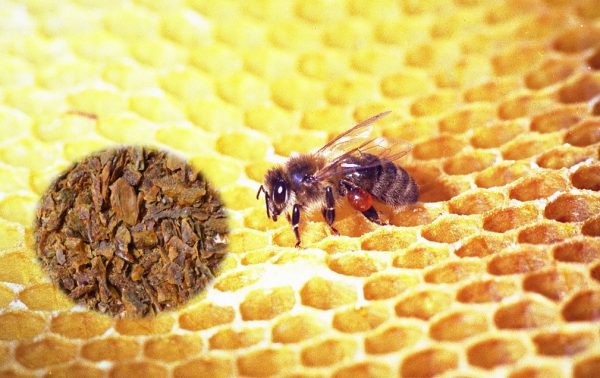
Propolis From Honey Bees Has Many Medicinal Properties
Propolis is a resinous substance produced by bees from the sap on trees, which they mix with beeswax and their own enzymes. It is used to seal small gaps in the hive and protect against intruders and infections. Propolis has been recognized for its medicinal properties and is widely used in traditional and modern medicine.
Composition of propolis itself is unique. Apart from pollen, it contains resins, wax, essential oils and other substances.
Components of Propolis:
- Resins and Balsams (50-60%) : These are collected from tree buds and are the main components of propolis. They contain a variety of phenolic compounds, including flavonoids, phenolic acids, and their esters.
- Wax (30-40%) : Beeswax is secreted by bees and mixed with the resins. It provides the structural component of propolis.
- Essential Oils (5-10%) : These volatile oils give propolis its aromatic properties and contribute to its antimicrobial activity.
- Pollen (5%): Pollen grains collected by bees provide proteins, vitamins, and minerals.
Organic Compounds in propolis:
- Flavonoids: Such as quercetin, pinocembrin, galanin, and chrysin. These compounds have antioxidant, anti-inflammatory, and antimicrobial properties.
- Phenolic Acids: Like caffeic acid and ferulic acid. They contribute to antioxidant and anti-inflammatory activities.
- Terpenes and Terpenoids: Contributing to antimicrobial effects.
- Amino Acids and Proteins: Including enzymes that may aid in propolis’ biological activities.
- Vitamins: Especially B vitamins and vitamin C.
- Minerals: Such as magnesium, calcium, and potassium
There are several ways propolis is useful for human health:
Antimicrobial properties: Propolis has demonstrated broad-spectrum antimicrobial activity against bacteria, viruses, and fungi. This makes it useful in treating and preventing infections:
- Bacterial Infections: Propolis can inhibit the growth of various bacteria, including Staphylococcus aureus and Escherichia coli.
- Viral Infections: It has shown efficacy against viruses like the herpes simplex virus (HSV) and influenza.
- Fungal Infections: Propolis can also inhibit the growth of Candida species, making it helpful in managing yeast infections.
Anti-inflammatory effects: Propolis contains compounds that can reduce inflammation:
- Chronic Inflammation: It may help manage conditions characterized by chronic inflammation, such as arthritis and inflammatory bowel diseases.
- Wound Healing: By reducing inflammation, propolis can promote faster healing of cuts, burns, and other skin injuries.
Antioxidant properties: Propolis is rich in antioxidants, which can help protect the body from oxidative stress and damage caused by free radicals:
- Cell Protection: Antioxidants in propolis can protect cells from damage, potentially reducing the risk of chronic diseases like cancer and heart disease.
- Anti-Aging: These properties may also contribute to anti-aging effects, helping to maintain healthy skin and overall vitality.
Immune system support: Propolis can enhance the immune response, helping the body to fight off infections and diseases more effectively:
- Immune Modulation: It can modulate the immune system, promoting a balanced immune response.
- Cold and Flu Prevention: Regular use of propolis may help prevent common colds and flu by boosting the immune system.
Wound healing and skin health: Propolis promotes the healing of wounds and supports healthy skin:
- Topical Application: Applying propolis to cuts, burns, and sores can speed up healing and reduce the risk of infection.
- Skin Conditions: It may help manage conditions like eczema, psoriasis, and acne due to its anti-inflammatory and antimicrobial properties.
Oral health: Propolis is beneficial for maintaining oral hygiene and preventing dental problems:
- Dental Caries: It can help prevent cavities by inhibiting the growth of bacteria that cause tooth decay.
- Gum health: Propolis can reduce inflammation and promote healing in the gums, helping to prevent gingivitis and periodontitis.
- Mouth ulcers: It can aid in the healing of mouth ulcers and reduce associated pain.
Anti-Cancer properties: Some studies suggest that propolis may have anti-cancer effects:
- Tumor growth inhibition: It may inhibit the growth of various cancer cells, including those of breast, skin, colon, and prostate cancers.
- Apoptosis induction: Propolis can induce apoptosis (programmed cell death) in cancer cells, helping to limit the spread of tumors.
Usage and forms: Propolis can be used in various forms, including:
- Tinctures and extracts: Alcohol-based or water-based extracts are commonly used for internal or topical application.
- Capsules and tablets: For convenient oral consumption.
- Topical creams and ointments: Applied directly to the skin for treating wounds, burns, and skin conditions.
- Mouthwash and toothpaste: For maintaining oral health.
Safety and precautions: While propolis is generally considered safe, there are some precautions to consider:
- Allergic reactions: People allergic to bee products should avoid propolis, as it can cause allergic reactions.
- Pregnancy and breastfeeding: Consult a healthcare provider before using propolis during pregnancy or breastfeeding.
- Interactions with medications: Propolis may interact with certain medications, so it is important to consult with a healthcare provider if you are taking other treatments.
Propolis offers a wide range of health benefits, making it a valuable natural remedy for various conditions. However, it is important to use it responsibly and consult with a healthcare provider when necessary.
Image credit: Hadi, CC BY-SA 4.0 <https://creativecommons.org/licenses/by-sa/4.0>, via Wikimedia Commons
Author: Sumana Rao | Posted on: December 27, 2024
« Health Benefits Of Puffed Paddy Laja Manda 9 Herbal teas – benefits & side effects »






















Write a comment